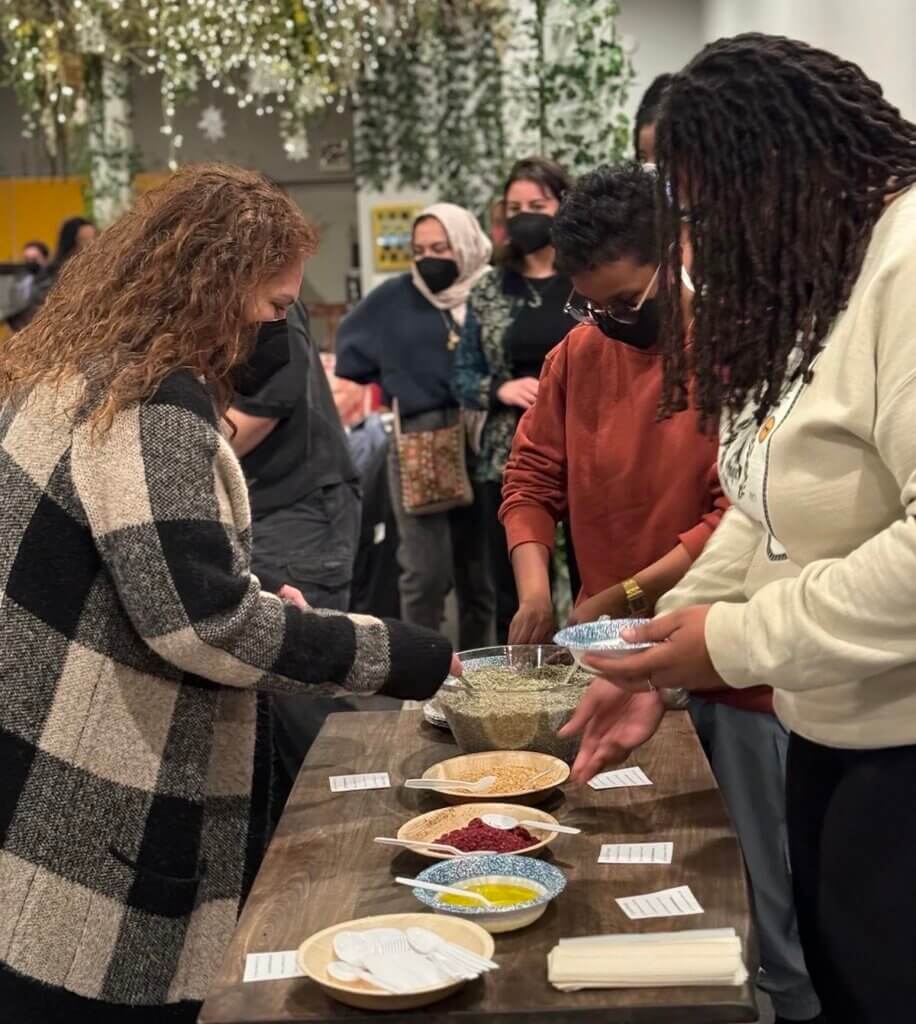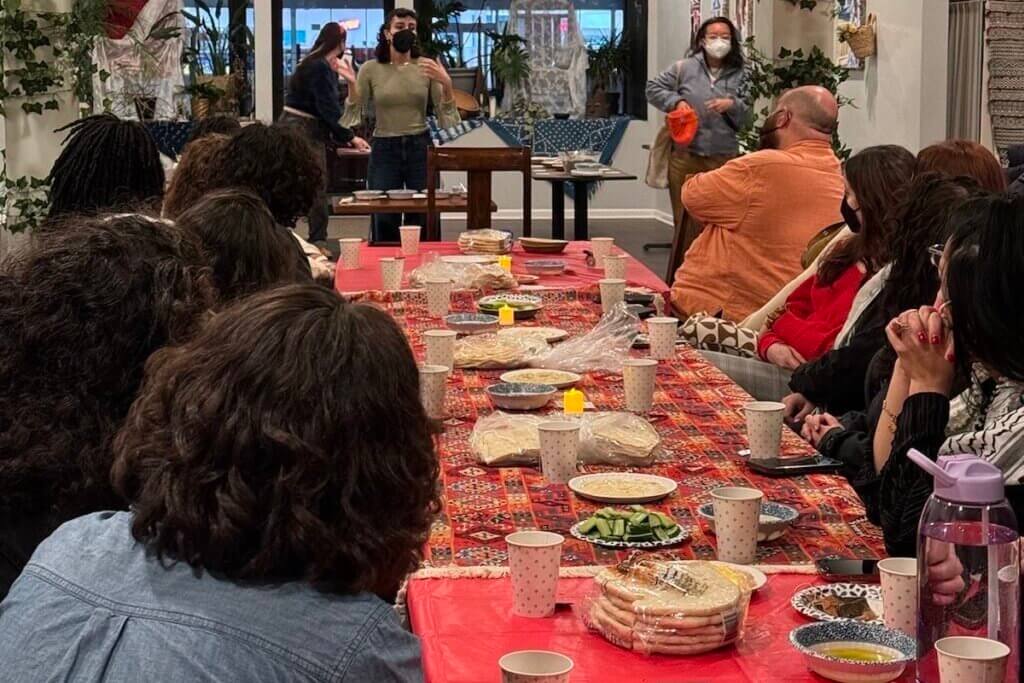For Reem Assil, a Palestinian-Syrian social justice activist, chef, and owner of Reem’s California, food is integral to resistance. She organized for ten years prior to becoming a chef. Community organizing is a key pillar of her culinary philosophy now, with many projects, including her worker-owned co-op restaurants, a groundbreaking commitment in the culinary world where private ownership abounds. “People always say that I was a former organizer turned chef, and I say, ‘No, food just happens to be the tool in my toolkit through which I’m organizing people now,’” Assil tells Mondoweiss.
Assil is a member of Hospitality for Humanity, a coalition of pro-Palestinian chefs, food industry workers, food writers, and other culture makers in the space, who in the face of the genocide in Gaza, where over 30,000 people have been killed in the past four months, have committed to supporting Palestinians and urging chefs and other people in the industry to boycott Israeli products and abstain from any cultural or political promotion of Israel.
And these boycotts, in particular, have been incredibly effective, like the ones against companies that support Israel, like McDonald’s, Coca-Cola, and Starbucks, and a refusal to dine at Israeli-owned restaurants that appropriate Palestinian and other SWANA (Southwest Asia and North Africa) cuisine. “Particularly around food, BDS has been a really amazing lesson, and so has the Civil Rights Movement,” Assil says. “Boycott was an amazing tool for organizing here and in the anti-apartheid movement in South Africa; it was ultimately what led to apartheid falling. Food is so intertwined with that because it’s how institutions normalize this appropriation and occupation — we can abstain from that. We can say we choose not to spend our money at a company like Sabra and Soda Stream and invest more in local Palestinian restaurants and bakeries.”
The theft of Palestinian food is an integral part of the Israeli occupation, both erasing Indigenous Palestinian culture and positing the ludicrous claim that these dishes are Indigenous to European Jewish settlers — or even Jewish settlers of other ethnicities — and therefore belong to the national identity of Israel rather than the sovereign people of Palestine and groups that share a pre-colonized border with Palestine, like people from Southern Lebanon, which is also under Israeli occupation and attack. You can see it in the vaguely classified “Middle-Eastern” restaurants that obscure Palestinian people and origins by naming dishes “Israeli salad” and assigning the word Israeli to dishes that belong to other parts of the region, like couscous and shakshuka, both of which originated from Indigenous people in Morocco and Algeria.
Rama, a Palestinian organizer and community member with the Chicago-based Salon Kawakib, says that it is the theft of Palestinian food that becomes central. “Because of the occupation and the nature of how it steals our culture and claims it as their own, a lot of Palestinians resist constantly by raising our voices and claiming our cultures very loudly.” Rama says, “One of the core battles is the battle of narrative, and so Israel is — and I think this is a component of settler colonialism — obscuring history by whitewashing our food systems.”
It is a common theme of Zionist propaganda to brush off attempts by Palestinians to claim their own food as ignorant or petty. But this act is crucial. Assil explains, “It is really important to claim ownership of our food but not to stop the conversation there. Jockeying ownership just for the sake of ownership doesn’t really say anything. But what we are actually saying is that we’re fighting a very intentional erasure of our cuisine meant to dehumanize us so that when we are experiencing a genocide, people aren’t empathetic.”
As we engage with food as a means of freedom, it is crucial to remember that because of its immense power, food is also one of those components of a revolution that can so easily be diluted. When we engage with food without political intent, it’s simply a dinner party, or just a commodity. Sabrina Beydoun, a chef and storyteller of the Lebanese diaspora, says, “Fundraising, especially when it’s tied to being a recipient of something you would otherwise already want, like delicious food, can sometimes rob us of the opportunity to think critically.” Assil puts it another way. “We don’t want to get to a place where it’s okay or cool to say a food is Palestinian, but no one is calling for a ceasefire or the end to occupation.”

That’s why, for those fighting for Palestinian liberation, food is presented with what Beydoun calls “political commitment.” Rama’s event with Salon Kawakib, which hosts introductory activist education for allies as well as cultural spaces centered on Palestinians and others in the SWANA diaspora, was a za’atar-making event. The za’atar Rama used is a green za’atar which is an herb traditionally harvested in Palestine. Dokka is a spice blend often called za’atar containing sumac, thyme, white sesame seeds, salt, and others that has been heavily appropriated and obscured, shuffled under that broad category of “Middle Eastern food” or the violently named “Israeli food,” instead of widespread recognition of its importance in Palestine and to specific Indigenous communities in the Levant.
For Rama, the event was a space for people to gather, but it was also one with clear political intent. She opened it by giving context; harvesting za’atar was prohibited by the Israeli regime in 1977 under the guise of environmental protection of the herb, which was found to have no scientific basis. The only thing it achieved was criminalizing Indigenous Palestinian herb-gathering practices, furthering the violent goals of the occupation. In order to attend this event, you must confront and acknowledge the occupation. It was a space of rest for those with a political commitment to Palestine but not a space where people without it would find easy comfort, assuaged guilt, or a romantic narrative.
“Za’atar has a lot of health benefits, it is known for a natural antioxidant and antibiotic, it’s also known for building memory, and a lot of people in the Arab world enjoy it for that reason,” Rama says. It would be easy for many to end the story here. But Rama and Salon Kawakib don’t allow the analysis to end in a place of comfort but rather a place of truth. “All that is true, and for Palestinians, the other reason why it’s so important is because it became prohibited,” she continues. “It became an act of resistance to eat and harvest za’atar despite the law that was passed.”
For Rama, a Palestinian phrase guides her. “Baqoon ma baqiya al Za’atar wal zaytoun/باقون ما بقي الزعتر و الزيتون,” she tells me. “It means ‘We remain as long as za’atar and olive oil remain.’ The phrase shows that za’atar carries a meaning of rootedness in the land for Palestinians and that the use of za’atar by Palestinians is to express their right to return.”
“The food I make is already inherently politicized, and I wasn’t the one to make that choice.”
Sabrina Beydoun
Beydoun believes that the menu is “a space of creative potential where chefs get control and can use the menu as an intentional site of agitation and cultural intervention for the public.” For one of her dinners in Lebanon, she named a seafood dish “The Sea is a Generous Neighbor,” to send a decolonial message about Palestine. “Lebanon is a land of far less significance than being a land that was robbed of its home but it was robbed of its indigenous neighbor, and there are parts of Lebanon that are still being occupied by the Israeli state today,” Beydoun explains, showcasing how she wanted this political concept to come through one dish. To those who might say that politicizing food is unnecessary, Beydoun has a frank response. “The food I make is already inherently politicized, and I wasn’t the one to make that choice.”
Food itself, no matter its origins, has become political for me in nature after over 130 days of bearing witness to a genocide through my phone. Always at the forefront of my mind is the knowledge that the people in Gaza are being starved by Israel’s brutal blockade and settlers who block aid trucks from getting in. Fellow writers in Gaza I’ve followed for years are now eating herbs for breakfast, posting about the intentional starvation Israel is inflicting upon them. It is not an exaggeration for me to say that every bite I have, every sip of water, reminds me of Gaza, reminds me of what I’m fighting for.
And food sustains us in these small ways in this movement: Flipping a tray of my friend’s mom’s maqluba onto my kitchen counter during a gathering, walking over leftover msakhan for a comrade too exhausted to make dinner, a granola bar passed in City Hall during a sit-in as we awaited the vote on the ceasefire resolution, a bag of Takis torn into and fingers brushing as we plan our next action. The constant reminders I have to make to myself, as a person with an eating disorder, that I must feed myself, that I must sustain myself so that I do what Gazans have directly asked of us — especially those living in the imperial core — which is to fight. And food is not just one tool that we use to fight. It is central to our directive because no life or culture exists without it. And in the movement for Palestinian liberation, we fight on behalf of life, until Palestine is free.



Wonderful article on the political nature of food. It reminds me of conversations about Black culture being demeaned but then appropriated by white people through food, hair styles, music, etc. And today I see the rise in interest of Native American food which is showing up in restaurants Native owned and in cook books they are writing. As you write about Palestinian food and its integral part of the culture, I find all oppressed people feel so connected to their history and identity thru food which is denied them under occupation and demeaned as part of the erasure of their existence. Thank you for writing this detailed piece which I will share.